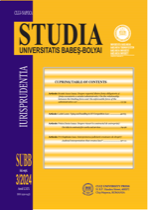Abstract
One of the major disputes in the Theory of Law is related to the limits of legal and judicial interpretation, with a predominant focus on the judge’s ability to create law. Although in the Romano-Germanic family of law, the role of the judge in the resolution of the case is limited by positive ultra-normatization, we observe that the judge creates and recreates law on every occasion, with every judgment pronounced. Not in an absolute libertinism, but sufficiently characterized, because in the „creative act of interpretation”, the judge remains sovereign. This is because by pronouncing the law (juris dictio) he brings it from its abstract and hypothetical state into concrete and immediate existence. Thus, we should see interpretation as ‚an act of creation’. Without interpretation, the rule itself would not be applicable, being merely an ontological, not an existential, virtuality. The characterization of a factual or legal situation as being governed by a particular superordinate legal rule necessarily entails not only the determination of that situation, but also the interpretation of that rule.

